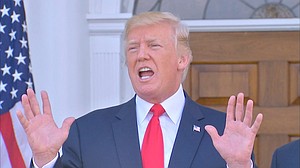7/16/2018

Analysis by Chris Cillizza, CNN Editor-at-large
(CNN) -- President Donald Trump has sent a lot of bad tweets. He's tweeted things that aren't true. He's tweeted personal attacks about everyone from Hillary Clinton to Mika Brzezinski and back. He's called North Korean dictator Kim Jong Un "Little Rocket Man." But a tweet he sent Monday morning -- just hours before sitting down with Russian President Vladimir Putin -- has to be the worst.
"Our relationship with Russia has NEVER been worse thanks to many years of U.S. foolishness and stupidity and now, the Rigged Witch Hunt!," tweeted Trump.
Let's be very, very clear about what Trump's tweet suggests: That the reason the US and Russia have an adversarial relationship is because of the special counsel investigating Russia's interference in the 2016 election.
Staggering. Stunning. Surreal.
Remember that the intelligence community -- unanimously! -- has concluded that Russia actively interfered in the 2016 election to help Trump and hurt Democratic candidate Hillary Clinton. The Senate Intelligence Committee, which is chaired by Republican Sen. Richard Burr of North Carolina concluded the same earlier this summer. Special counsel Robert Mueller charged a dozen Russians last week for their roles in what the charging document made clear was a broad and deep operation to influence the US presidential election.
Simply put: With the exception of a handful of Republicans on the House Intelligence Committee, there is simply no one in a position to know who thinks that a) Russia didn't meddle in the 2016 campaign and b) wasn't trying to help Trump and hurt Clinton.
But wait, there's more! Last week, Dan Coats, the Trump administration's Director of National Intelligence, was blunt in his assessment of Russia's ongoing assault on the United States' infrastructure. "The warning signs are there," Coats said in a speech at the Hudson Institute. "The system is blinking. It is why I believe we are at a critical point. Today, the digital infrastructure that serves this country is literally under attack."
And yet, amid all of that -- not to mention Russia's alleged poisoning of Sergei Skripal and its invasion and annexation of Crimea -- the President of the United States saw fit to turn the blame for the bad relationship between the two countries on the US. And specifically on an investigation launched by his Justice Department and run by Mueller, who was appointed head of the FBI by Republican President George W. Bush -- a position he held for a decade. An investigation that has already produced five guilty pleas including from Trump's 2016 deputy campaign chairman and his former national security adviser. An investigation that has revealed a widespread plot by the Russians to meddle in American elections to sway the vote toward candidates they believe are more favorable to them.
All you need to know about Trump's Monday morning tweet is that it was a big hit in Russia. "We agree," tweeted the Russian Foreign Ministry in response to Trump's tweet.
Trump's willful ignorance of the fact -- and yes, I do mean FACT -- that Russia actively interfered in the 2016 election is bad enough. His defense of Putin -- he says he didn't do it! -- in the face of the unanimous intelligence community conclusion that Russia did, in fact, meddle in our election is even worse. The silence of Republicans who would have crushed a Democrat -- or any other Republican politician -- for saying one tenth of what Trump has said (and tweeted) is appalling.
But none of those things can match what Trump did Monday morning: Blaming America for a problem Russia created. And not just any problem. An attempt to undermine confidence in fair and free elections, a principle that sits at the heart of what has long distinguished the US from Russia and other authoritarian countries.
To see Trump's tweet through a partisan or political lens is to miss the point. At root, what we are talking about is a foreign power engaging in purposeful, strategic and effective cyberwar against the United States. And not just once either -- as Coats' comments last week make clear. This is about defending what makes America great (sound familiar?).
To call into question an attempt to ensure that future elections aren't affected in any way by foreign interference is the opposite of patriotism.
